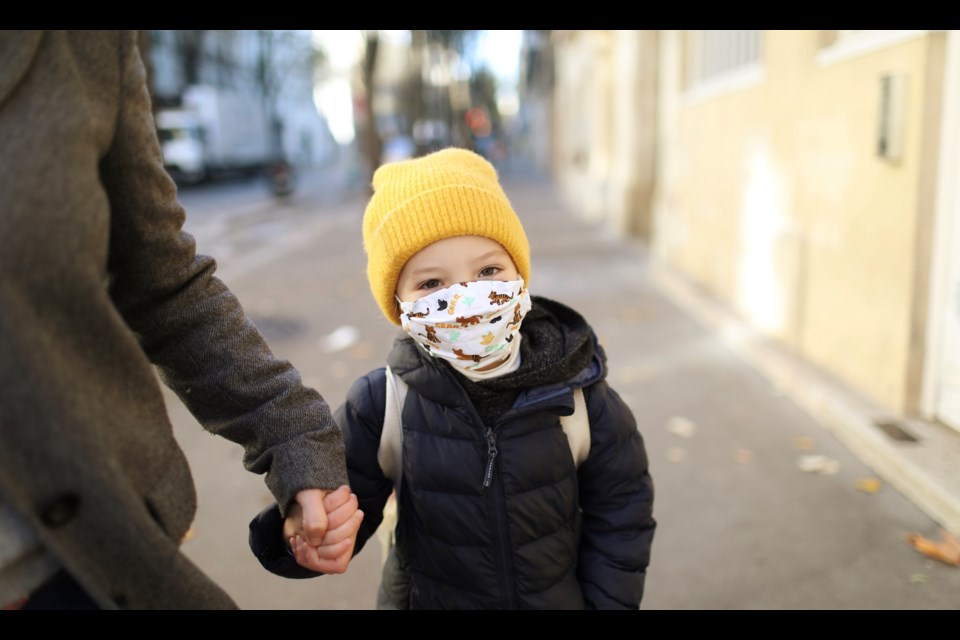Mental health, social and educational disruptions have been the most significant impacts on children related to the pandemic, according to B.C. Children's Hospital.
The hospital has been keeping a close eye on the Omicron COVID-19 variant and its impact on kids.
“B.C. Children’s Hospital is still seeing few children who have been hospitalized for COVID-19,” said B.C. Children’s Hospital infectious disease pediatrician Dr. Laura Sauvé.
“At this time, we have 11 children in hospital who tested positive for COVID-19. About one quarter of those were admitted to hospital specifically for COVID-19. The others are in hospital due to other illnesses and happen to test positive for COVID-19, which reflects the high number of COVID-19 cases in the community.”
Sauvé says B.C. Children's can't release specific numbers for children under the age of five due to patient privacy, but did say that some of the kids who have been admitted to hospital for other reasons then test positive for COVID-19.
"This is often the case and will increasingly be the case as numbers in the community go up," Sauvé said, explaining B.C. Children's Hospital data shows a high proportion of children in hospital who test positive for COVID-19 were admitted for other reasons.
There is a similar story across all populations. The B.C. government said Friday about half of COVID-19 hospitalizations examined during an audit at Vancouver hospitals in December were "incidental infections" — they were tested for some other reason and found to have COVID-19.
B.C. Children's and B.C. Women's hospitals are also closely monitoring staffing levels, down to the individual unit and employee level to ensure patient care remains consistent.
“The number of beds we have available at BC Children’s is less impacted by children with COVID-19 and more impacted by health-care workers, who are sick and not available to be at work,” said Sauvé.
B.C. Children's is ready to redeploy staff to the highest areas of need, including to other health authorities in B.C. and they are monitoring the COVID-19 situation in Canada and around the world.
“Ontario and Quebec seem to be seeing more severe illness in infants and young children, but we don’t know yet if it’s because so many more children are acquiring COVID-19 or if the proportion of kids getting quite sick is going up. We are not seeing this in B.C., but public health physicians and pediatricians are following that closely,” Sauvé says.
B.C. Children's data indicates that while children tend to get less ill from COVID-19 compared to adults, in rare cases they can get quite sick.
Sauvé says the most significant health effects of the pandemic on children in Canada have been on their mental health and educational outcomes.
She said balancing safety with maximizing connection with peers and activities is very important.
“Be thoughtful about in-person social interactions over the next month or so,” says Sauvé. “Try to think what is necessary and what isn’t necessary, keeping in mind your child’s mental health. Also be mindful of those who may be vulnerable to COVID-19 in your life, including grandparents and young children who aren’t vaccinated yet – and who your children might be around after their social interactions.”
According to B.C. Children's, studies show social isolation, including school absences, can lead to unhealthy behaviours, like, excessive screen time, reduced physical activity, and substance use. This can lead to increased depression and anxiety, eating disorders, thoughts of suicide and delayed education or development.
B.C. Children's continues to believe the best way to prevent serious illness from COVID-19 is vaccination.
Two doses of vaccine are still highly effective at preventing severe disease and boosters are effective at preventing infection with the Omicron variant.
“The vaccine for five to 11-year-olds is very safe, as is the vaccine for the older ages of children and adults,” said Sauvé.
According to the National Advisory Committee on Immunization an eight-week interval between vaccine doses for children remains the most effective way to fight COVID-19.
Pfizer-BioNTech and Moderna COVID-19 vaccine trials on children under five years of age are ongoing.



